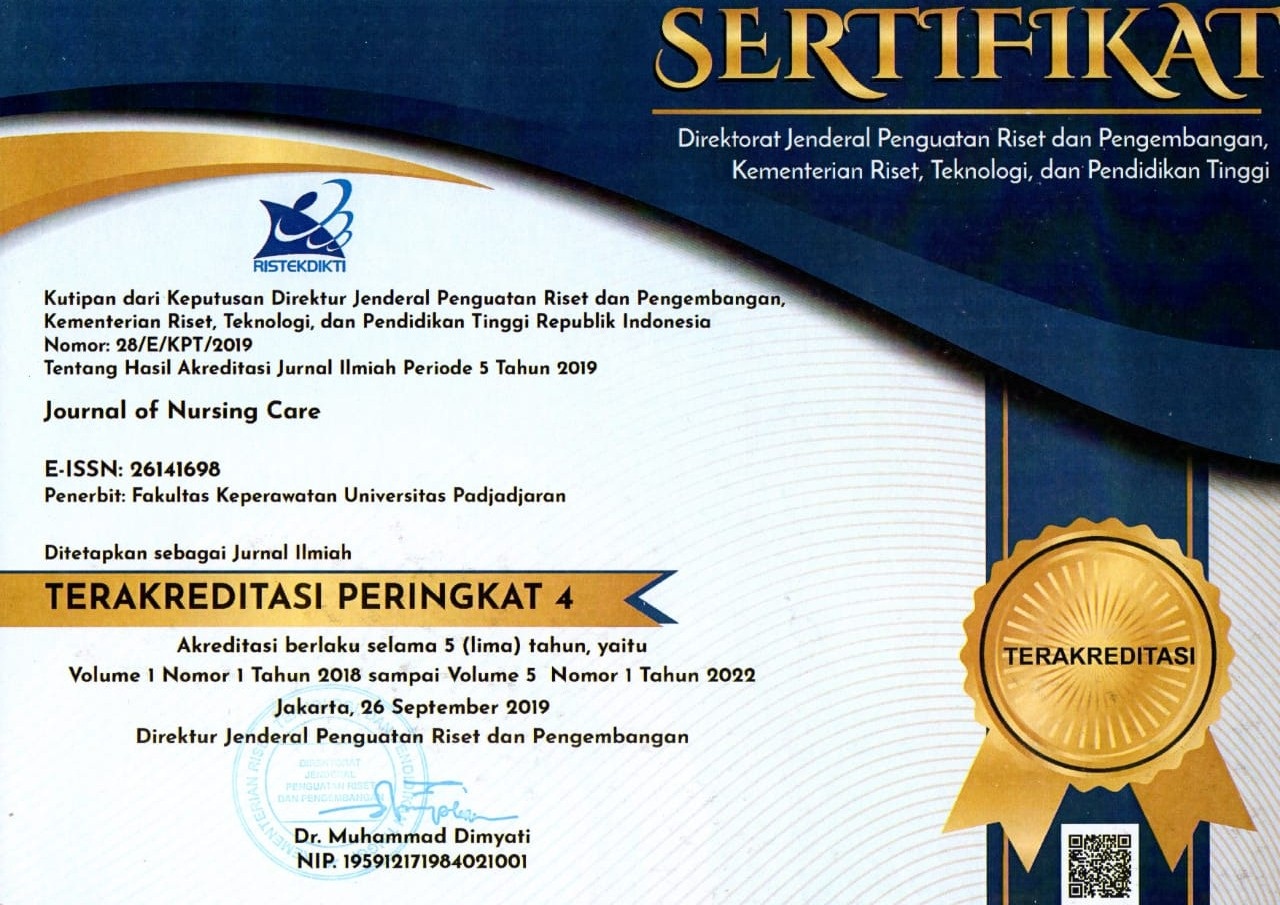Relationships Between The Elderly Knowledge and The Use of Traditional Antihypertensive Drugs
Abstract
The aging process will be experienced by the elderly which is a decrease in the ability of the heart that can trigger the occurrence of hypertension. Treatment using herbs is an alternative treatment to overcome hypertension. Some plants that have antihypertensive activity are celery, cat’s whiskers, bay leaves, and noni. This study aimed to identify whether there was a relationship between knowledge of the elderly and the use of anti-hypertensive traditional drugs. This study was a descriptive correlation research with cross sectional approach. The sample of this study were 37 elderly people in one neighborhood of Hegarmanah Village. The sampling technique used total sampling technique. Data were collected using questionnaire through interview. The questionnaire consisted of 11 questions, namely 1 question about whether or not using traditional antihypertensive medication, 10 questions for knowledge variables, The results showed that nearly 65% of respondents used traditional antihypertensive drugs and 22% of the elderly had good knowledge. The results of chi-square test showed no significant relationship between the knowledge of the elderly and the use of traditional antihypertensive drugs with p value 0.13. The social culture had influence to make personal decision to use of traditional antihipertensive drugs.
Keywords
Full Text:
PDFReferences
BIBLIOGRAPHY
Afa, K.P., Raevonne, A.S., Brett J.W., Norman, K., & Jarakae, J. (2008). The Effects of Morinda Citrifolia L. Noni on High Blood Pressure: A Mechanistic Investigation and Case Study. American Chemical Society. Vol. 993, 446–453. Tersedia Online di http://pubs.acs.org/doi/abs/ 10.1021/bk-2008-0993.ch039 [Diakses pada tanggal 9 januari 2018].
Almatar, M., Ekal, H., & Rahmat, Z. (2014). A Glance Applications of Orthosiphon stamineus and Some of its Oxidative Compound. International Journal of Pharmaceutical Sciences Review and Research. Vol. 24., No. 2., p. 84.
Budiarto, E. (2002). Biostatika untuk kedokteran dan Kesehatan Masyarakat. Jakarta : EGC. 11-28
Chan, E.C., Pannahpech, P., & Woodman, O.L.(2000). Relaxation to Flavones and Flavonols in Rat Isolated Thoracic Aorta: Mechanism of Action and Structure-Activity Relationship. Journal of Cardiovascular Pharmacology. Vol. 5., p. 326-333.
Depkes RI. Riset Kesehatan Dasar. (2013). Jakarta: Badan Penelitian dan Pengembangan Kesehatan Kementrian Kesehatan RI.
Gharouni, M., & Sarkati, A. (2000). Application of Apium graveolens in Treatment of Hypertension. Journal of Tehran University of Medical Sciences, Vol. 3., p. 67–69.
Gusmira, S. (2012). Evaluasi Penggunaan Antihipertensi Konvensional dan Kombinasi Konvensional-Bahan Alam Pada Pasien Hipertensi di Puskesmas Wilayah Depok. Makara Kesehatan, Volume 16(2), p.77-83.
Halberstein, R. A. (2005). Medicinal Plants: Historical and Cross-cultural Usage Patterns. Ann Epidemiol. Vol. 15., No. 9. p. 99- 686.
Hidayat, A. (2009). Metode Penelitian Kebidanan Dan Tekhnik Analisa Data. Jakarta: Salemba Medika.
Jorge, V.G., Angel, J.R. L., Adrian, T.S., Francisco, A.C., Anuar, S.G., Angel, S.O., & Emmanuel, H.N. (2013). Vasorelaxant Activity of extracts obtained from Apium graviolens: Possible Sourcr for Vasorelaxant Molecul Isolation with Potential Antihypertensive effect. Asian Pasific Journal of Tropical Biomedicine. Vol. 3., No. 10., p. 776-779.
Kementerian Kesehatan Republik Indonesia. (2014). Pusat Data dan Informasi Kementerian Kesehatan RI tentang Hipertensi. Jakarta: Kementrian Kesehatan Republik Indonesia.
Kowalski., Robert, E. (2007). Terapi Hipertensi. Alih Bahasa: Rani Ekawati. Jakarta: Mizan Pustaka.
Notoatmodjo. (2007). Kesehatan Masyarakat Ilmu dan Seni. Jakarta: PT. Renika Cipta.
Pudjiastuti., Sri Surini., & Utomo, Budi. (2003). Fisioterapi pada Lansia. Jakarta: EGC.
Rahajeng, E., Tuminah, S. (2009). Prevalensi Hipertensi dan Determinannya di Indonesia. Maj Kedokt Indon. 59(12): hlm. 550-587.
Riduwan. (2009). Skala Pengukuran Variabel-Variabel Penelitian. Bandung: Alkabeta.
Saputra, O., & Fitria, T. (2016). Khasiat Daun Seledri ( Apium graveolens ) Terhadap Tekanan Darah Tinggi Pada Pasien Hiperkolestrolemia. Majority. Vol (5). Nomor (2).
Setiawan, D. (2009). Atlas Tumbuhan Obat Indonesia Jilid 6. Jakarta: Pustaka Bunda.
Situmorang, Paskah Rina. (2015). Faktor-faktor yang Berhubungan dengan Kejadian Hipertensi pada Penderita Rawat Inap di Rumah Sakit Umum Sari Mutiara Medan Tahun 2014. Jurnal Ilmiah Keperawatan: Vol. 1, No, 1
Stanley, M., & Beare, P. G. 2007. Buku Ajar Keperawatan Gerontik. Edisi 2. Jakarta: EGC
Tamher., & Noorkasiani. (2009). Kesehatan Usia Lanjut dengan Pendekatan Asuhan Keperawatan. Jakarta : Salemba Medika.
Tedjasukmana, Pradana. (2012). Tata Laksana Hipertensi. CDK-192/ vol. 39 no. 4. Corwin, Elizabeth J.2000. Buku Saku Patofisiologi. EGC: Jakarta
Umar. (2005). Metodologi Penelitian Untuk Skripsi Dan Tesis Bisnis. Jakarta
WHO. (2014). Global target 6: A 25% relative reduction in the prevalence of raised blood pressure or contain the prevalence of raised blood pressure, according to national circumstances. Jenewa: World Health Organization.
Wijayakusuma, H.M. (2000). Ramuan Tradisional untuk pengobatan Darah Tinggi. Jakarta: Swadaya.
Wiryowidagdo, S. (2002). Obat tradisional untuk penyakit jantung, darah tinggi dan kolestrol. Jakarta : Agromedia Pustaka.
Xingjiang Xiong., Xiaochen Yang., Wei Liu., Fuyong Chu., Pengqian Wang., and Jie Wang. (2013). Trends in the Treatment of Hypertension from the Perspective of Traditional Chinese Medicine. Evidence-Based Complementary and Alternative Medicine. Volume 2013. Tersedia Online di http://dx.doi.org/10.1155/2013/275279 . [Diakses pada tanggal 9 januari 2018].
DOI: https://doi.org/10.24198/jnc.v3i2.18770
Refbacks
- There are currently no refbacks.

This work is licensed under a Creative Commons Attribution-ShareAlike 4.0 International License.










Redaksi Journal of Nursing Care:
Fakultas Keperawatan, Universitas Padjadjaran
Jalan Raya Bandung-Sumedang Km. 21 Jatinangor, Sumedang, Indonesia 45363
WA: 085314295890
Tlp. 022-7795596
Email: jnc.fkep@unpad.ac.id

This work is licensed under a Creative Commons Attribution-NonCommercial 4.0 International License


